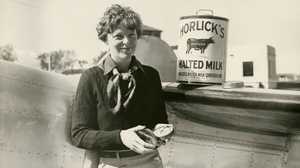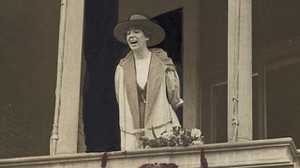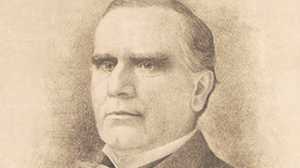Did you hear the one about Bob Hope?
Over the course of his long, prolific career, Bob Hope conquered stage, screen, radio, and television. His USO shows, delivered to American troops stationed around the world and later broadcast to record-breaking audiences at home, made him a national hero during World War II and a controversial must-see during Vietnam. American Experience spoke to Richard Zoglin, author of Hope: Entertainer of the Century, about the icon’s contributions to comedy, connections to the military, and precedent-setting philanthropy.
Bob Hope started out on the vaudeville circuit. What was that life like and how did it influence him?
Vaudeville was a major form of popular entertainment in the early part of the century. Virtually all the comedians of that era started out in vaudeville. You moved from town to town, you learned how to improvise, you learned what audiences wanted. Bob Hope always credited vaudeville as his school in show business. It's where he learned to love working to live audiences. Bob stayed in vaudeville for a long time — about nine or 10 years. He wasn't an overnight success — he earned his spurs. But it turned him into a really good and resourceful performer, who knew every aspect of the business.
What kind of act did he do?
Most of the comedy acts at the time were teams who did very structured bits. They had these prepared routines that they would repeat from town to town. Bob originally did an act like that — he had a partner and they would dance and tell some jokes. But he broke away from the traditions of vaudeville comedy when he started to work as an emcee. As an emcee, he talked directly to the audience, and he had to ad lib. He would introduce the acts and make jokes about them. He might have to cut the show if it got long, or stretch the show if it was short. So he learned a more spontaneous, conversational kind of comedy style. And it was that style that I think Bob developed into what we think of today as stand-up comedy.
Hope started appearing in films in the 1930s, and went on to become a huge movie star. He also became a radio host with The Pepsodent Show in 1938. You write in your book that he immediately hired a bunch of writers. Was it unusual for a host to work with a large team of writers?
Hosts usually had a few writers, but guys like Jack Benny, Burns and Allen, and Edgar Bergen — who had the most popular radio shows at the time — all had established characters and routines. They knew what they were doing, so their writers just wrote sketches around these very familiar characters.
Bob didn't have a character to play when he first started out in radio. And he really wanted to do an opening monologue. He wanted lots of jokes for the monologue, and he told his writers to read the papers and write jokes based on the news. Now, this was something that no one else was doing. It meant a lot more writing needed to be done. In fact, they would write a couple hundred jokes for each show, and Bob would go through and pick the best 20 or 30, or whatever it was. Nobody was creating that much comedy, that many jokes per half hour.
So he has all these writers churning out hundreds of jokes. Was Hope himself funny?
I thought about that a lot as I was writing the book. He definitely needed his writers, acknowledged his writers, and was very upfront about using writers. But In the end, I do think he was very funny.
He had to have talent. He would select the jokes he wanted to use and often edit them. He knew the rhythm he wanted. He knew how he was going to deliver them — and delivering a line is as important as writing the line. There are also lots of examples of when things went wrong on the show and Bob had to improvise. He had a natural flair for comedy. He talked funny, and was playful with words. One writer, Larry Gelbart, told me that Bob was funnier in person than he ever was in his monologues.
Can we trace the monologues we hear on today’s late-night shows to Hope?
I definitely think so. No one was doing topical monologues at that time, in the early ‘40s. Every week he would make jokes about what was in the news. Then Johnny Carson came along and really popularized that kind of monologue. The late-night guys today would probably tell you that Johnny Carson is the originator of their kind of monologues. But, of course, I think Johnny Carson couldn't have existed if it were not for Bob Hope.
In 1942, Hope does his first show on a military base. Where was he in his career at that point, and how is he received?
He was just about at the peak of his career. His radio show was number one. He was turning out two or three movies a year, and every one was a box office hit. And then he starts going on these military tours. Everybody was focused on the war, and there was Bob Hope entertaining the troops; he was seen as a patriotic hero. He was not the only star by any means to go overseas, but nobody did it more often than he did, or connected more with the troops. He knew how to joke with them — he really felt a connection with them and they with him. In ‘43 he went to Europe and North Africa, and in ‘44 to the Pacific theater. He's reaching guys who haven't seen anybody from back home in months and months. He’s this big American star that they know from radio and movies, showing up personally to entertain them. It really meant a lot to those guys, and it was quite an achievement at a time when it was difficult to travel around to those places. They had to fly on little planes, and sometimes they were caught in air raids.
Considering the danger and the fact that he was already this huge star, what motivated him to do so many of these trips?
I think his main motive was a patriotic desire to do something for the troops — to do what he did best for the troops. Cynics will say it was a great career move and it was part of his image, and that's true, too. He certainly was very smart about his career. But those were also great audiences; 5,000 men sitting in New Guinea or something, watching him — they were ready to laugh at anything. So he liked it for those reasons. But paramount above all, I think he really did get enormous satisfaction from contributing to the war effort in a way that he could.
The first time one of these overseas trips aired on TV was actually after World War II, in 1955. How did that come to be?
During the Christmas season of 1954, Bob went to the Arctic Circle for a couple of days to entertain troops at a strategic air command base. He was doing specials at NBC at the time, and it was NBC’s idea to film his shows up there. They edited them and aired it as a special a couple of weeks later. And that show got great ratings. So it became an annual thing. He would go someplace or other where U.S. troops were stationed at Christmastime. And those specials were almost always the best-rated Bob Hope shows of the year.
Can you describe the format of those specials?
It would be partially a kind of travelogue documentary: Here's Bob Hope and his group traveling to the Middle East or Korea or wherever. And then they would intersperse it with footage from the actual shows that he performed for the troops. Later, when Vietnam came along, the documentary part of it became a little more prominent, and more interesting to the people back home.
These shows, especially during the Vietnam years, drew huge audiences. What did Americans get out of watching them?
The specials really showed the scope of the war effort. You can see the enormous crowds that were watching him, and it gives you an idea of how many men we had over there. He gave audiences a glimpse of them. For people who supported the war, it was a great booster; for people who opposed to the war, they saw all these men over there, and wondered why. So it was interesting to both sides. It brought the war into the living room in a unique way.
What was Hope’s stance on the war?
At first, he would argue that he was not a supporter of the war, he was just a supporter of the troops. Wherever the troops were, we had to support the troops. Well, in Vietnam, people started to disagree with that, too. They didn't support the troops because they felt the troops shouldn't be there in the first place. And Bob just could not understand that attitude. So he started to speak out. Whereas earlier he could say he was just supporting the troops, as the controversy went on, he began to be a supporter of the Nixon administration’s approach to the war: We ought to be bombing North Vietnam, we need be pursuing this war all out and not holding back at all. He would say that, and that was a partisan statement at that time.
He had not really been partisan before. During World War II, there was little controversy about the war. Everybody knew that this was America fighting for its life, and almost everyone supported the troops and the war. Things changed in Vietnam. It wasn't a war that everybody agreed with and there was more doubt as it went along. But Bob stuck to that World War II mentality that when your country got into a war, you automatically supported it. You didn't question it.
He also became good personal friends with President Nixon. Do you think Nixon used him to promote the administration’s policies?
Definitely. Nixon was very smart about using whatever friends he had in Hollywood and the sports world, or wherever else. And Bob was a great spokesman for him. Nixon would even bring him into the White House and give him personal updates on the Vietnam War situation, implicitly assuming that Bob would then carry that message out to the rest of the country. To counter the anti-war demonstrations, the Nixon administration helped organize patriotic, pro-administration events. Bob would be an entertainer at these “pro-war demonstrations.” He was a big Hollywood name they could get out for those kind of events at a time when most of Hollywood was starting to turn against the war — and he became controversial along with it.
Before Vietnam, Hope was this incredibly popular, well-liked figure. By the end, people were actually protesting him and his appearances. Did his reputation ever recover?
I don't think he ever totally recovered from that. After the war, he tried to heal the wounds and put it behind him. But there was a residual bad taste left in the mouth of a lot of the younger generation over Vietnam. Plus, there was the fact that Bob was getting older by that point. It's the ‘70s — and he's in his 70s. His shows are getting worse and worse. He's reading the cue cards. He's not as fast as he was when he was younger. His jokes are kind of old fashioned — he's still making fun of hippies and talking about Dean Martin's drinking. He's looking like an old guy now.
Hope died in 2003 at the age of 100. What is his legacy?
I think his legacy dates way back. Not only was he was a pioneering standup comedian, he learned how to brand himself. He was not just a movie star or a TV star, he wrote books, he wrote a newspaper column — he had a golf tournament with his name on it. Everybody knew what Bob Hope stood for and what his image was. He created a brand called Bob Hope. And that was a very modern concept at the time.
His other important legacy was all the charity work that he did — and not just the USO shows. Public service was so much a part of his image and his career, more so than any other Hollywood celebrity of the time. He made the case that if you’re a big star, you have an obligation to do more than just sign autographs and buy a fancy home in Malibu. You have an obligation to use your celebrity to give back, to do good work for good causes, to have a role on the public stage. That's a huge contribution that I don't think is usually recognized, and one of the reasons why I wrote the book.







